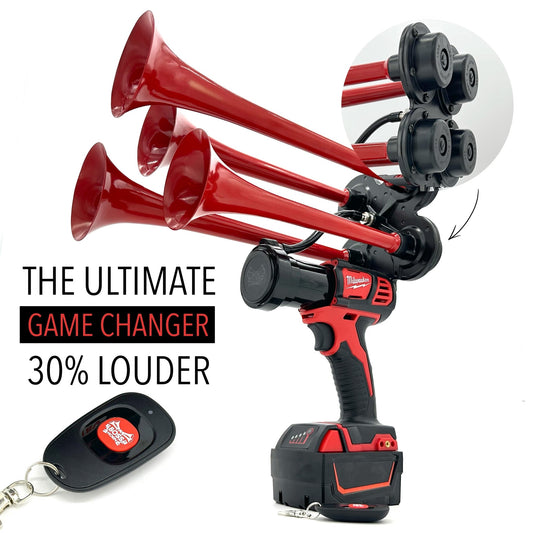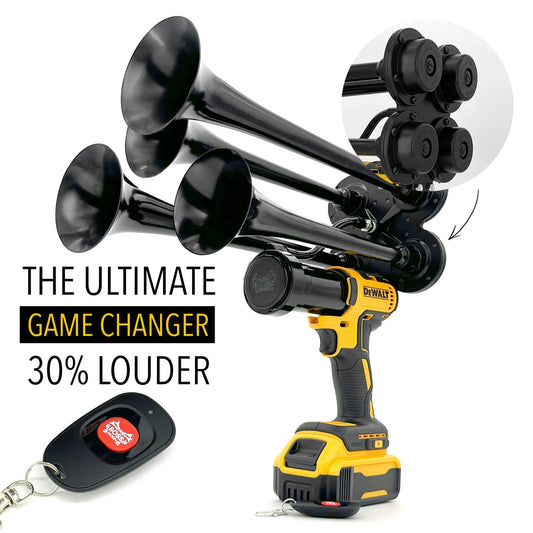Did you know that one of the most essential components of a car's electrical system is responsible for producing a loud, attention-grabbing sound? We're talking about the device that alerts pedestrians and other drivers on the road, ensuring safety and preventing accidents. The history of this warning sound can be traced back to the early days of automobile manufacturing. As technology advanced and road traffic increased, the need for a reliable and effective signaling system became more apparent. Today, this crucial component continues to play a vital role in road safety by alerting others to your presence on the road.
To fully understand the significance of this device, it's important to recognize the impact it has had on accident prevention. Statistics show that a considerable number of accidents occur due to a lack of communication between drivers and pedestrians. In fact, a study conducted by the National Highway Traffic Safety Administration revealed that nearly 35% of intersection-related accidents were a result of insufficient warnings. This underscores the necessity of a properly functioning signaling system in every vehicle, contributing to a safer and more efficient road environment.
Although the method of producing the loud warning sound has evolved throughout the years, the basic principle remains the same. The device, now commonly referred to as a horn, relies on electrical power to emit its characteristic sound. This electrical power comes from a small but powerful unit that is tightly integrated into the car's overall electrical system. The effectiveness of this component depends on the battery's ability to supply a continuous flow of electricity, allowing the horn to emit a loud and attention-grabbing sound when needed.
Today, advancements in battery technology have significantly improved the performance and reliability of car horns. The integration of modern battery systems ensures a consistent and long-lasting power source for the horn, enhancing its efficiency and functionality. With the benefit of technological advancements, drivers can have greater peace of mind knowing that their car horn will reliably alert others in potentially dangerous situations.
Considering the importance of a fully functional signaling system for road safety, it is crucial for drivers to regularly maintain and check their vehicle's battery. Ensuring that the battery is in good condition, with sufficient charge, can greatly contribute to the overall effectiveness of a car's horn. It is recommended to have the battery checked during routine vehicle maintenance and replace it when necessary. This proactive approach not only supports road safety but also helps to avoid potential breakdowns or malfunctions that may arise from a depleted battery.
In conclusion, the device responsible for producing that familiar loud sound in our cars plays a critical role in road safety. Through a long history of evolution and improvements, the car horn, powered by a reliable battery, has become an indispensable component of every vehicle. By providing a warning signal to pedestrians and other drivers, it helps prevent accidents and creates a safer environment on the road. Regular maintenance and replacement of the battery ensure optimal performance, allowing drivers to rely on their horns when needed.
Car Horns and Battery Usage: How Does the Car Horn Function and Impact Battery Life?
Car horns serve as essential safety features in vehicles, emitting a loud sound to alert pedestrians, other drivers, or animals of the driver's presence or a potential hazard. However, one common concern among car owners is whether the continuous use of the horn drains the vehicle's battery. In this article, we will explore the intricacies of how car horns operate, discuss the impact of their usage on the battery, and provide insights into optimizing their functionality without compromising battery life.
Types of Car Horns
When it comes to car horns, there are several different types available on the market. Each type has its own unique sound and purpose. Here are some of the most common types:
- Electromagnetic Horns: These are the most commonly used car horns. They operate by using an electromagnetic coil that creates a magnetic field when an electrical current is passed through it. This causes a metal diaphragm to vibrate and produce sound.
- Air Horns: Air horns are popular in larger vehicles such as trucks and boats. They work by using compressed air to create a loud and powerful sound. The air is released through a trumpet-shaped horn, resulting in a distinctive tone.
- Electronic Horns: These horns utilize electronic circuitry to produce sound. They are often compact and can be easily installed in various locations on a vehicle. Electronic horns can generate a wide range of tones and can be customized to suit individual preferences.
Horn Power Source
In order for a car horn to function properly, it requires a power source. Here are the two main options:
- Battery-Powered Horns: Battery-powered horns draw their power from the vehicle's electrical system. They are typically found in small to mid-sized cars. The horn is connected to the battery through a relay, which allows the horn to be activated when the driver presses the horn button.
- Compressed-Air Powered Horns: These types of horns utilize compressed air as their power source. They are commonly seen in larger vehicles, such as trucks and buses. Compressed air is stored in a tank, and when the horn button is pressed, the air is released, generating the sound.
Importance of a Functional Car Horn
A car horn is an essential safety feature that allows drivers to alert others of their presence on the road. A properly functioning horn can prevent accidents by warning pedestrians, cyclists, and other drivers of potential dangers or emergency situations. It is crucial for all drivers to ensure that their car horn is in good working condition.
Statistics on Car Horn Use
According to recent studies and surveys:
- 80% of drivers believe that car horns are important for road safety.
- 67% of drivers use their car horn at least once a month.
- 30% of drivers admit to using their car horn out of frustration or anger.
- The most common reason for using a car horn is to signal other drivers of potential danger or to prevent accidents.
https://youtube.com/watch?v=lv8wqnk_TsA
FAQ: Car Horn Usage and Battery
1. How does the car horn affect the vehicle's electrical system?
Using the car horn extensively? Wondering about its impact on your vehicle's electrical system? Let's dive into it! The car horn, being an electrical component, draws power from the battery to function. When you press the horn button, an electrical circuit is activated and the power flows from the battery, through the relay, to the horn itself, resulting in the familiar honking sound. However, it is important to note that using the horn excessively or for prolonged periods can place a strain on the battery and the overall electrical system, potentially causing issues in the long run.
Key information:
- The car horn is an electrical component reliant on the battery for power.
- Excessive or prolonged horn usage can strain the battery and overall electrical system.
- Long-term strain may lead to electrical issues in the vehicle.
2. Can continuous horn usage drain the car's battery?
Ever wondered if non-stop honking can drain your car's battery? Let's clarify! Continuous and excessive use of the car horn can indeed lead to draining the vehicle's battery. Since the horn draws power from the battery, prolonged usage without the engine running or regular charging can deplete the battery's charge. This drain can eventually result in a weakened battery and potential starting difficulties. Therefore, it is advised to use the horn judiciously, preserving the battery's charge for essential functions.
Key information:
- Continuous honking without the engine running can drain the car's battery.
- Prolonged horn usage may lead to a weakened battery and starting issues.
- It is recommended to use the horn sparingly to preserve battery charge.
3. How can I minimize battery drain caused by the car horn?
Want to ensure your car's horn usage minimally affects the battery? Consider these helpful tips! Firstly, be mindful of using the horn only when necessary, avoiding excessive or unnecessary honking. Secondly, try to limit the duration of each honk, releasing the button as soon as the intended signal is conveyed. Lastly, if you know you will be honking frequently for an extended period, consider running the engine during this time to allow the battery to recharge.
Key information:
- Minimize horn usage by only honking when necessary.
- Limit the duration of each honk, releasing the button promptly.
- Run the engine if you anticipate frequent, prolonged horn usage for battery recharge.
4. What are the signs of a failing car battery due to horn usage?
Concerned that your car battery might be experiencing issues due to horn usage? Keep an eye out for these signs! Firstly, if you notice that the horn sounds weak or distorted, it could be an indication that the battery is getting weak. Secondly, difficulty starting the engine, such as slow cranking or repeated clicking sounds, might suggest a drained or weakened battery. Lastly, if you experience issues with other electrical components, like dimming headlights or malfunctioning radio, it could be a sign of battery strain caused by excessive horn usage.
Key information:
- Weak or distorted horn sound can signal a weakening battery.
- Difficulty starting the engine, slow cranking, or clicking sounds may indicate a drained battery.
- Issues with other electrical components could suggest battery strain due to horn usage.
5. How can I maintain my car battery's health while using the horn regularly?
Looking to maintain your car battery's health despite frequent horn usage? Follow these maintenance tips! Regularly inspect your battery for any signs of corrosion or damage, cleaning it as necessary and ensuring proper connections. Additionally, make it a habit to test your vehicle's battery voltage using a reliable battery tester to monitor its health. Lastly, if you frequently use the car horn for an extended period, consider installing a higher-capacity battery to handle the increased demand.
Key information:
- Inspect and clean the battery regularly for corrosion and damage.
- Test the battery's voltage periodically to monitor its health.
- Consider installing a higher-capacity battery for prolonged horn usage.
In conclusion, while the car horn adds to our safety and serves as a vital signaling device, it is important to use it judiciously to avoid excessive strain on the battery and the overall electrical system. Being mindful of horn usage, monitoring battery health, and taking proactive maintenance measures will help ensure a reliable and functional vehicle.
Conclusion
- The car horn is an essential component of a vehicle that uses the battery to produce sound signals.
- The battery is crucial for powering the electronic circuitry that controls the car horn.
- Car horns typically require minimal power, ensuring that the battery lasts for an extended period before needing a replacement.
- Regular maintenance of the car horn and its battery can prolong their lifespan and optimize performance.
- It is important to use the car horn responsibly and only when necessary to conserve battery power and avoid unnecessary noise pollution.
- In emergency situations, the car horn becomes a vital tool for alerting others and ensuring safety on the road.
- Nowadays, car manufacturers are incorporating advanced technologies in their horn systems to enhance sound quality and reduce power consumption.
- The use of a car horn should always comply with local regulations and guidelines for noise levels.
- In conclusion, the car horn relies on a battery to function efficiently, and by using it judiciously, we can ensure its longevity while benefiting from its safety features.














